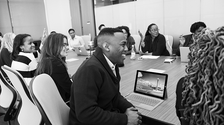Introduction
As we find ourselves grappling with the monotony of the discouraging B2 plateau, one question arises very often: Am I not practicing the right way? As we see ourselves not progressing at the pace we expected to, we ask ourselves if we are doing anything wrong. And effectively, we must pay heed to this question as its answer is the trick to overcome the B2 plateau: we must change our strategies and incorporate new practices in our learning. To do so, it is fundamental to understand what B2 is and how we should best start preparing ourselves for advanced-level proficiency.
New Elements
One way to define the B2 level is as a transition from B1 to C1, from Intermediate to Advanced. In other words, we transition from being a learner to a proficient speaker who can use the language in real-life contexts. Therefore, we must think of B2 as a preparatory stage for advanced-level proficiency. As mentioned above, it is imperative that as language learners, we incorporate new elements into our learning strategy.
Consequently, it will be worth examining what elements constitute advanced-level listening comprehension and how best we can include them in our learning process. Having understood these elements, we should be able to decide what content checks the most boxes and best fits the different categories.
Understanding What to Watch
Authentic Material
Up until B1, the content we use for input skills i.e. listening and reading principally consists of language-learning material. In other words, we practice with content that is designed and curated specifically for language learners. This is why, the rate of speech, lexical choice, and grammatical complexity in our texts and videos are all suited to the level we are at.
However, as we move on to the B2 level, we gradually make the transition to authentic, real-life material that has been created for users proficient in this language.
Across Registers and Genres
Perhaps the most important advice a language learner must heed is never to limit oneself to one kind of videos or texts. A language is diverse, complex, and multi-layered, which is exactly how our learning materials should be. The informal setting of films and series is just as important as the formal register of interviews and speeches; the casual tone of podcasts is just as important as the professionalism we encounter in news channels. Therefore, we need more than one kind of content or one kind of genre or style to be able to acquire the language in all its richness and complexity.
To familiarize ourselves with the language across registers and genres and styles, we must remember to make our content just as diverse. Our learning materials should include series, podcasts, panel discussions, speeches, and much more.
A multitude of Domains
Another point to consider is an element fundamental to advanced-level proficiency. One way to express this idea would be as follows: at an Advanced level, we start using our target language to study other subjects. In other words, a proficient user of English will be capable of reading and listening to academic texts and lectures pertaining to effectively any subject, be it biology, philosophy, history, and so on. Such content will improve our comprehension skills exponentially, at the same time, introducing us to subject-specific vocabulary.
In order to introduce academic content, we must first ask the question: which subjects interest us? It is recommended that a language learner tries different channels and different subjects to explore a wider range of subjects and fields that may interest them.
Following is a list of YouTube channels I have personally found highly informative and suitable to the comprehension level of advanced-level learners. It is also worth noting that these channels introduce us to a range of styles, formats, and registers.
Recommendations
Science and Technology
Cleo Abram
Tech Altar
The Physics Girl
Literature
The School of Life
Pursuit of Wonder
Movies and Series
Studio Binder
Learn English with TV Series
Philosophy
Overthink Podcast
Academy of Ideas
Eternalized
Business and Finance
‘The Economics of’ by Wall Street Journal
The Art of Business
CNBC Make It
Bloomberg Originals
Geopolitics
Vox
Johnny Harris
Al Jazeera
Macro Economy
Economics Explained
Ted invites experts from a wide range of fields.
Documentaries are a rich source of academic-style content and subject-specific vocabulary.
Some other channels worth visiting:
BBC Ideas
CGP Grey
Psych2go
Everyday Contexts and Candid Conversations
So far, the channels we have discovered can be immensely useful for the development of listening comprehension and critical thinking in our target language. Instead of listening to each word, our primary goal is to comprehend the video. In other words, to understand its key idea(s); the purpose of the video; the views, opinions, and attitudes expressed by the speaker(s); and lastly, how the ideas are developed and extended.
However, equally important in terms of listening comprehension and ultimately, Spoken English is to listen to native speakers have casual, candid conversations on general, everyday topics and in relatively informal settings. Only through such content can we acquire an understanding of the pronunciation features of the language (stress patterns, connected speech, thought chunking and so on) and at the same time, develop Conversational Fluency. It is also a rich source of everyday vocabulary. As a result, this type of content is incredibly useful for acquiring proficiency in Spoken English.
This category includes a diverse range of listening material: conversational podcasts, films and series, talk shows, stand-up comedians, Comic-Con Panel discussions, celebrity interviews, Youtubers, and much more. Following is a list of YouTube channels and series that I found engaging and amusing.
Recommendations
Sitcoms
Modern Family
Brooklyn Nine-Nine
Friends
The Big Bang Theory
Stand-up Comedians
Rafi Comedy
Michael McIntyre
Kenny Sebastian
Trevor Noah
Talk Shows
The Ellen Show
Trevor Noah’s The Daily Show
Conan O’Brien
Evidently, this is in no way an exhaustive list of any of these categories. While these are simply some personal recommendations, there is an endless list of sitcoms series podcasts, and news channels which we can watch. At the end of the day, what we must remember is to look for dialogue-intensive content and to familiarize ourselves with different accents, genres, and formats.
To Recapitulate
In order to reach advanced-level proficiency in Listening, a language learner must remember to:
1.Gradually introduce authentic material to their curriculum
2.Use a variety of different sources to acquire language skills across registers and genres
3.Listen to academic content to acquire subject-specific vocabulary
4.Listen to native speakers in informal settings to learn the Pronunciation features and acquire Conversational Fluency
Conclusion
Following the tips laid out in this article will help us better curate content to improve our listening skills and take them to higher levels of proficiency. While the content we choose ultimately depends on our language goals, one thing that we must not forget is to be consistent in our learning.
And that is not possible if our chosen content does not interest us. This is why it is the most important advice I can give you: choose content that you find fascinating and the rest of everything will fall into place on its own.
So, what content do you watch? Are there any channels, films, or series that you would recommend?







